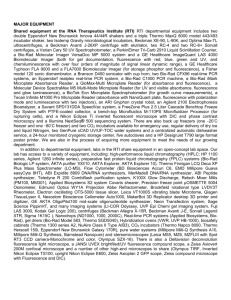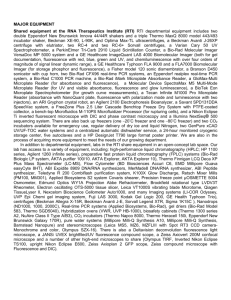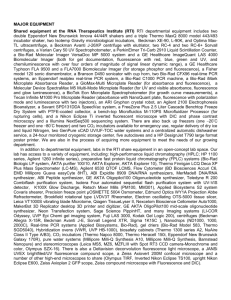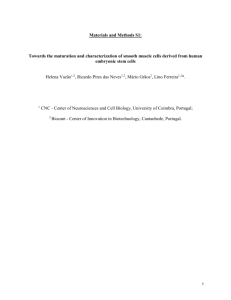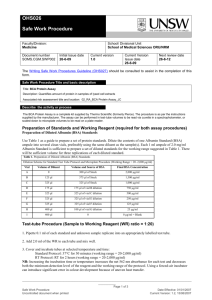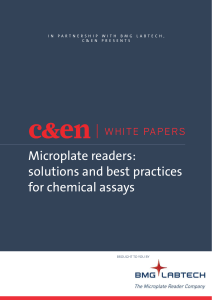SpectraMax Multi-Mode Microplate Readers datasheet rev E
advertisement
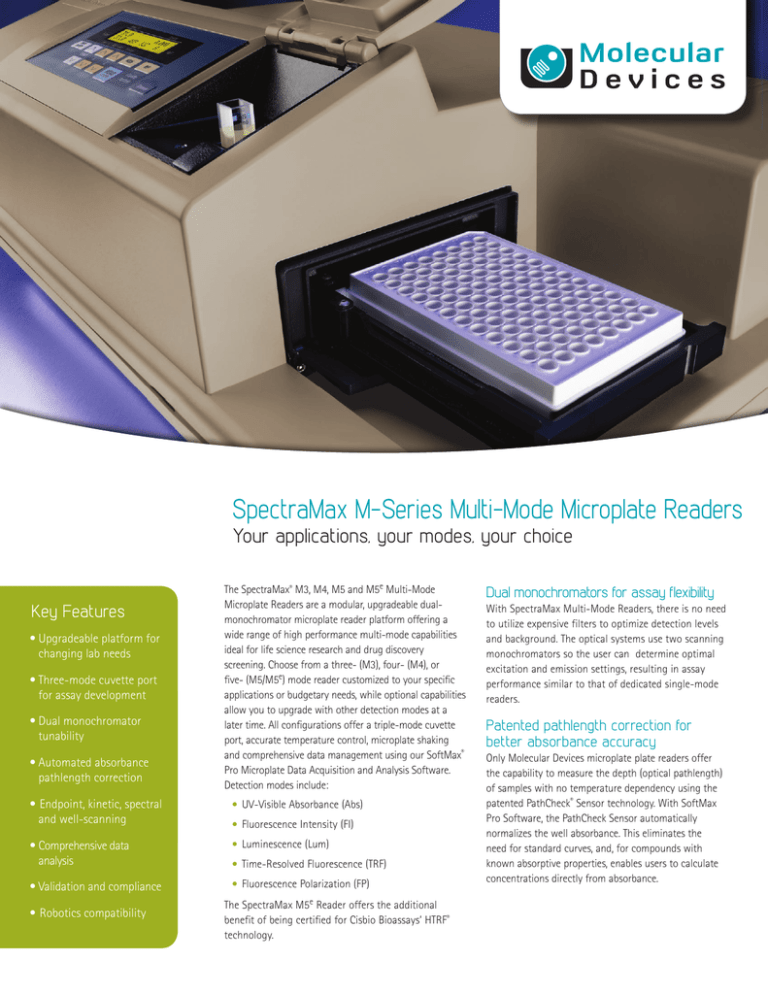
SpectraMax M-Series Multi-Mode Microplate Readers Your applications, your modes, your choice Key Features • Upgradeable platform for changing lab needs • Three-mode cuvette port for assay development • Dual monochromator tunability • Automated absorbance pathlength correction The SpectraMax® M3, M4, M5 and M5e Multi-Mode Microplate Readers are a modular, upgradeable dualmonochromator microplate reader platform offering a wide range of high performance multi-mode capabilities ideal for life science research and drug discovery screening. Choose from a three- (M3), four- (M4), or five- (M5/M5e) mode reader customized to your specific applications or budgetary needs, while optional capabilities allow you to upgrade with other detection modes at a later time. All configurations offer a triple-mode cuvette port, accurate temperature control, microplate shaking and comprehensive data management using our SoftMax® Pro Microplate Data Acquisition and Analysis Software. Detection modes include: • Endpoint, kinetic, spectral and well-scanning • UV-Visible Absorbance (Abs) • Comprehensive data analysis • Luminescence (Lum) • Validation and compliance • Fluorescence Polarization (FP) • Robotics compatibility • Fluorescence Intensity (FI) • Time-Resolved Fluorescence (TRF) The SpectraMax M5e Reader offers the additional benefit of being certified for Cisbio Bioassays’ HTRF® technology. Dual monochromators for assay flexibility With SpectraMax Multi-Mode Readers, there is no need to utilize expensive filters to optimize detection levels and background. The optical systems use two scanning monochromators so the user can determine optimal excitation and emission settings, resulting in assay performance similar to that of dedicated single-mode readers. Patented pathlength correction for better absorbance accuracy Only Molecular Devices microplate plate readers offer the capability to measure the depth (optical pathlength) of samples with no temperature dependency using the patented PathCheck® Sensor technology. With SoftMax Pro Software, the PathCheck Sensor automatically normalizes the well absorbance. This eliminates the need for standard curves, and, for compounds with known absorptive properties, enables users to calculate concentrations directly from absorbance. Five-mode microplate reading with superior optics Unique optical characteristics Assay collaboration for ease-of-setup 1. Reference diodes enable elimination of measurement noise due to slight fluctuations in excitation light intensity. Molecular Devices has collaborated with various assay partners to optimize and validate homogeneous and heterogeneous biochemical- or cell-based assay performance on the SpectraMax platform. To support these assays, we provide application notes as well as ready-to-run protocols in our SoftMax Pro Software. Some of our featured partner assays include HTRF assays from Cisbio Bioassays and LanthaScreen® TR-FRET assays from Invitrogen (now part of Life Technologies). 2. Angled emission beam improves signal-to-noise, especially in narrow Stokes shift fluorophores, by reducing stray light. 3. Elliptical mirrors are used instead of lenses for maximum transmission with minimal wavelength distortion. IMAP PLATFORM ® 4. Top-quality UV-grade fibers give the highest light transmission down to even the lowest wavelengths. VALIDATED Superior optics for optimal assay performance To emission monochromator and PMT From excitation monochromator Top read head FL, TRF, FP Excitation Reference diode FL, TRF, FP, Lum Emission Mirror Abs Beamsplitter and excitation polarizer Emission mirror Emission polarizers Absorbance detector diode Microplate Emission mirror Beamsplitter Beamsplitter FL, TRF, FP Excitation Excitation mirror From excitation monochromator FL, TRF, FP, Lum Emission Reference diode Abs Bottom read head Reference diode From excitation monochromator To emission monochromator and PMT Which SpectraMax Multi-Mode Microplate Reader do you need? Detection Modes Absorbance Fluorescence Intensity Luminescence SpectraMax M3 Reader SpectraMax M4 Reader SpectraMax M5 Reader SpectraMax M5e Reader ü ü ü ü ü ü ü ü ü ü ü ü ü ü ü ü ü ü TRF, HTRF, FP HTRF, FP HTRF N/A ü ü ü ü Time-Resolved Fluorescence Fluorescence Polarization HTRF Upgrade Options Plate Formats 6-, 12-, 24-, 48-, 96-, 384-Well Microplates Certification and Validation ü IMAP Validation (TR-FRET only) ü (TR-FRET only) ü ü ü ü ü ü ü ü ü ü ü ü ü ü ü ü ü ü ü ü ü ü ü ü ü ü ü ü ü ü ü ü ü ü ü ü ü ü ü ü ü ü ü ü ü ü HTRF Certification LanthaScreen Certification ü (TR-FRET only) Key Applications ADME-Tox Cell Migration Assays Cell Viability and Cytotoxicity Assays DNA/RNA Quantitation ELISAs Enzyme Kinetics Fluorescent Proteins and FRET Low Volume Applications Membrane Permeability Neurotransmitter Transporter Uptake Assay Protease Assays Protein Assays QBT Fatty Acid Uptake Assay Reporter Gene Assays ü ü ü ü ü ü ü ü ü ü ü ü ü ü Comprehensive software and validation Comprehensive data analysis and GxP solutions Validation and compliance of optical characteristics SoftMax Pro Software provides data acquisition, analysis and management capabilities, allowing cross-plate analysis, custom calculations, and personalized reporting. For users operating in a FDA 21 CFR Part 11 compliant environment, SoftMax Pro GxP Software is available, allowing user permissions, audit trails, e-signature and reporting tools. SpectraMax Readers have the most complete level of product validation and compliance. Molecular Devices provides the complete solution covering the instrument and software: • SpectraTest® ABS1, FL1, and LM1 Validation Plates for hardware validation of absorbance, fluorescence, and luminescence modes • IQ/OQ for all microplate readers • SoftMax Pro Software Validation Package • Software tools for FDA 21 CFR Part 11 compliance Powerful, user-friendly software Validation test plates for Abs, FI, Lum optical performance SpectraTest ABS1 Absorbance Plates, FL1 Fluorescence Plates, and LM1 Luminescence Plates are used to validate optical performance of SpectraMax M3, M4, and M5/M5e Microplate Readers. SoftMax Pro Software features over 140 ready-to-use protocols for data acquisition; customizable spreadsheet functionality for analysis; powerful graphing tools for data presentation; and a flexible notes section for concise delivery of critical results. Flexibility for your assay needs Robotics compatibility for increased throughput Highly customizable low volume applications SpectraMax Multi-Mode Microplate Readers can be easily integrated with our optional StakMax® Microplate Stacker for walk-away processing. Operated from within SoftMax Pro Software, the StakMax Microplate Handler can hold up to 50 plates and facilitates barcode reading. Molecular Devices’ unique SpectraDrop™ MicroVolume Microplate offers the highest throughput solution for low volume measurement available on the market today. The innovative and flexible design features enable accelerated sample preparation time and increased laboratory productivity in DNA, RNA and protein research. The SpectraDrop Microplate assures uniform and reproducible analysis and integrates seamlessly with the StakMax Stacker for greater research capacity. For more advanced automation needs Molecular Devices interacts with all of the major lab automation providers, and is one of their leading choices. The SpectraDrop Micro-Volume Microplate offers the ability to use as little as 2 µL samples with 24- or 64-well plates. StakMax Microplate Handling System Compatible automation solutions for SpectraMax Readers R ELISAs DNA/RNA Purity Quantization & Normalization Kinetic Assays Integrate any SpectraMax Multi-Mode Reader with the StakMax Microplate Handling System from Molecular Devices. The system provides automation for up to 50 microplates for easy walkaway automation. System setup and calibration are controlled from within SoftMax Pro Software. Membrane Potential QA Testing Analysis Solubility & Permeability Cytotoxicity SoftMax Pro Software has been integrated by many leading robotics and LIMS partners, enabling both data analysis and instrument control in automated environments. Technical specifications General Specifications Fluorescence Intensity Performance Dimensions (in.) 8.6 (H) x 22.8 (W) x 15.3 (D) Reading capabilities Cuvette or top or bottom of a microplate Dimensions (cm) 22 (H) x 58 (W) x 39 (D) Wavelength range 250–850 nm Weight 36 lbs. (16.4 kg) Wavelength selection Monochromators, tunable in 1.0 nm increments Power consumption < 420 watts Bandwidth (EX, EM) 9 nm, 15 nm Power source 100–240 VAC, 3.5 A, 50/60 Hz Optimized sensitivity Robotic-compatible Yes ≤ 1 pM fluorescein in 96 wells, ≤ 1.5 pM in 384 wells Guaranteed sensitivity** < 5 pM fluorescein in 96 wells or cuvette, < 20 pM in 384 wells General Photometric Performance Plate formats 6, 12, 24, 48, 96, 384 wells Light source Xenon Flash Lamp (1 joule/flash) Reading capabilities Cuvette or top or bottom of a microplate Detectors 2 photomultiplier tubes (PMT) Wavelength selection Shaker time 0 to 999 seconds Temp. control 2°C above ambient to 60°C Choice of simultaneous detection of all wavelengths or selection via monochromator, tunable in 1.0 nm increments Temp. uniformity < 1°C at 37°C set point Wavelength range 250–850 nm Temp. accuracy ±1°C at 37°C set point Optimized sensitivity ≤ 43 pM ATP in 96 wells Endpoint reading All modes Guaranteed sensitivity** ≤ 75 pM ATP in 96 wells Kinetic reading All modes Dynamic range > 6 decades Spectral scanning All modes Cross-talk < 0.3% in white 96- and 384-well microplates Well scanning Abs, FI, TRF, Lum Luminescence Performance Time-Resolved Fluorescence Performance (M4, M5, M5e only) Standard Read Times (minutes:seconds)* 96 wells 384 wells Absorbance 0:18 0:49 Fluorescence Intensity 0:17 0:48 Fluorescence Polarization 0:42 2:03 Reading capabilities Top or bottom of a microplate Wavelength selection Monochromators, tunable in 1.0 nm increments Bandwidth (EX, EM) 9 nm, 15 nm Precision data collection 1–100 flashes, delay of 0–600 µsec. before read, integration time selectable between 50–1500 µsec. Time-Resolved Fluorescence 0:17 0:48 Optimized sensitivity ≤ 10 fM europium in 96 Luminescence 2:00 7:00 Guaranteed sensitivity** ≤ 100 fM europium in 96 or 384 wells SpectraMax M5e Reader only Certified to Cisbio Bioassays’ HTRF technology performance specifications Absorbance Photometric Performance Reading capabilities Cuvette or microplate Wavelength range 200–1000 nm Wavelength selection Monochromator, tunable in 1.0 nm increments Wavelength bandwidth ≤ 4.0 nm Wavelength accuracy ±2.0 nm Wavelength repeatability ±0.2 nm Photometric range 0–4.0 OD Fluorescence Polarization Performance (M5/M5e only) Photometric resolution 0.001 OD Photometric accuracy (microplate) < ±0.006 OD ±1.0%, 0–2 OD Photometric accuracy (cuvette) < ±0.005 OD ±1.0%, 0–2 OD Photometric precision < ±0.003 OD ±1.0%, 0–2 OD Stray light < 0.05% @ 230 nm Wavelength range 300–750 nm Wavelength selection Monochromators, tunable in 1.0 nm increments Bandwidth (EX, EM) 9 nm, 15 nm Optimized Precision ≤ 3.5 mP standard deviation at 1 nM fluorescein in 96 wells Guaranteed Precision** < 5 mP standard deviation at 1 nM fluorescein in 96 wells * With 3 flashes/well in absorbance and fluorescence modes, and 1 sec./well integration in luminescence. ** For properly functioning, operated, and maintained equipment. Contact Us Regional Offices Phone: +1-800-635-5577 Web: www.moleculardevices.com Email: info@moldev.com Check our website for a current listing of worldwide distributors. USA and Canada Brazil China (Beijing) China (Shanghai) Germany +1-800-635-5577 +55-11-3616-6607 +86-10-6410-8669 +86-21-3372-1088 00800-665-32860 Japan (Osaka) Japan (Tokyo) South Korea United Kingdom The PathCheck Sensor is covered under U.S. Patents 5,959,738, 6,188,476, 6,320,662, 6,339,472, 6,404,501, 6,496,260 and 6,995,844. SpectraMax M3, M4, M5, and M5e Readers are also covered under U.S. Patents 6,097,025 6,232,608, 6,236,456, 6,313,471, 6,316,774, 6,693,709, 6,825,921, and 7,663,755. +81-6-7174-8831 +81-3-6362-5260 +82-2-3471-9531 +44-118-944-8000 FOR RESEARCH USE ONLY. NOT FOR USE IN DIAGNOSTIC PROCEDURES. The trademarks used herein are the property of Molecular Devices, LLC or their respective owners. ©2012 Molecular Devices, LLC • 8/12 • Printed in USA • PN: 0120-1498.E
